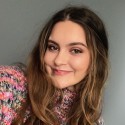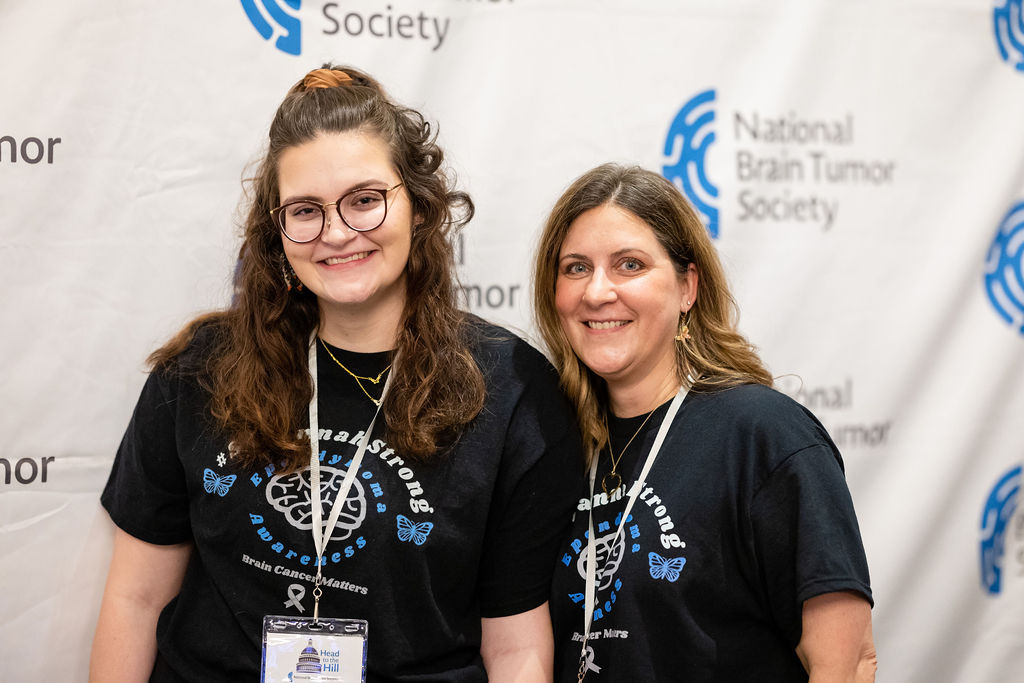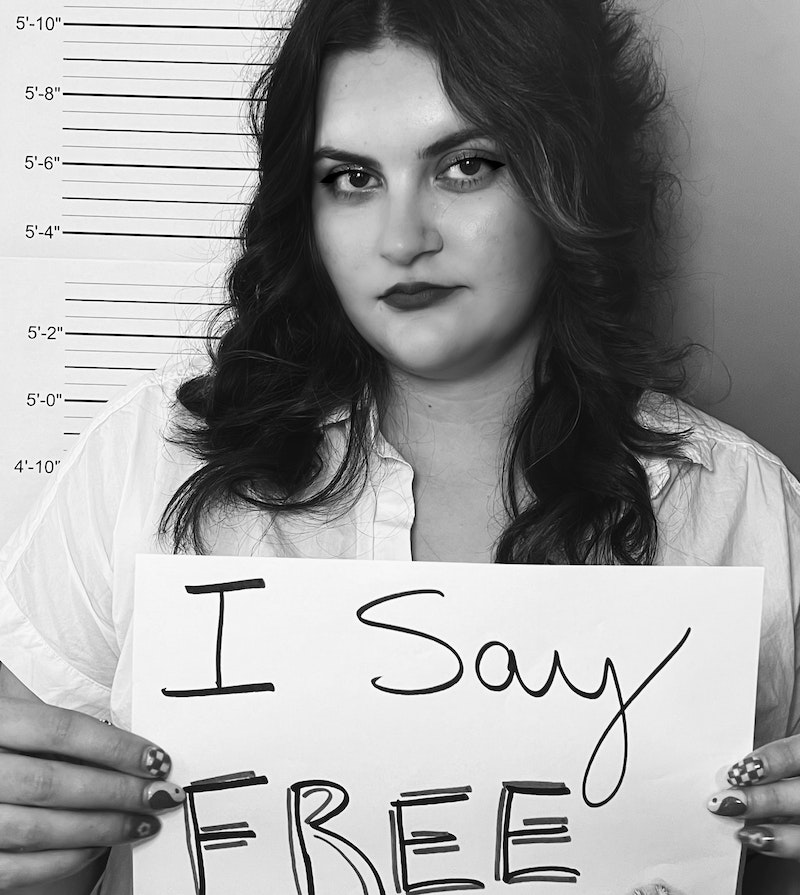What I wish people knew about what it is like to be a young adult with a brain tumor.

Name: Savannah
Type of Cancer: Anaplastic Ependymoma Grade 3
Diagnosed: Spring 2022
By: Savannah
— Categories:
“We found a mass.” Those are four words that a 21-year-old never expects to hear.
It was April 1, so part of me felt like someone was pulling a sick April Fools’ Day joke on me. I wished that had been the case, but it wasn’t a sick joke — it was reality. I have never felt more scared or anxious than at that moment.
A Shocking Diagnosis
After experiencing months of debilitating neurological symptoms — absence seizures, headaches, weight loss, sensory deficits, vision changes, fatigue, etc. I finally had an MRI that unearthed a discovery that will forever change my life.
I was fast-tracked through the ER and rushed to Neuro-ICU, where I was diagnosed with a brain bleed and a brain tumor on my left parietal lobe. I spent that first night in the ICU alone. Two days after that, I had a craniotomy to remove the tumor. I received the diagnosis of grade 3 anaplastic ependymoma, and I completed 30 days of radiation and 42 days of oral chemotherapy treatments.
It was like my life just stopped. I felt hopeless and angry, and said to myself, “Why me? How is this fair?” I’m young, and I’m supposed to be living my life, and doing fun things with my friends. Instead of being a part of the fun, I found myself being angry at others doing the activities I wished I could do.
Being a Young Adult with Cancer
I wish people knew that cancer does not have one certain “look.” Every day I walked into treatments, I felt isolated. I was always the youngest one in the cancer center, and it made me feel alone. I felt like I got weird looks from people like, “Why are you here? You look healthy. You don’t look like you’ve lost any hair.” This made me feel like my experience and feelings were not valid, and it was hurtful. Going through this experience looks different for everyone because every individual with cancer is unique.
Even though I have an amazing support system at home, I felt like I could not talk to anyone because they could not possibly understand. They could feel some sort of empathy, but they would never truly understand because they had never gone through what I had. This is when I realized there needs to be more resources and support groups available for young adults with rare types of cancers like ependymoma.
Realities of Survivorship
 I wish people knew that we can’t just flip a switch and go back to “normal” after receiving this diagnosis. My ultimate goal while in the hospital was to go back to my normal life as quickly as I could. However, I soon realized that this would not be possible. My life has permanently shifted in the most traumatic way possible. I am constantly faced with anxiety and guilt. The anxiety stems from worries that my tumor will re-appear. It also stems from the cognitive deficits and fatigue I face on a daily basis and knowing that my brain and body will probably never work the same. I feel guilty because even though I know it’s not my fault, I feel bad for all of the things my family has gone through because of my illness.
I wish people knew that we can’t just flip a switch and go back to “normal” after receiving this diagnosis. My ultimate goal while in the hospital was to go back to my normal life as quickly as I could. However, I soon realized that this would not be possible. My life has permanently shifted in the most traumatic way possible. I am constantly faced with anxiety and guilt. The anxiety stems from worries that my tumor will re-appear. It also stems from the cognitive deficits and fatigue I face on a daily basis and knowing that my brain and body will probably never work the same. I feel guilty because even though I know it’s not my fault, I feel bad for all of the things my family has gone through because of my illness.
I see people my age around me enjoying their youth. They are able to go to parties, concerts, and other social gatherings without worrying about having a compromised immune system. They don’t have the nagging thought of “what if it’s growing back?” constantly in the back of their mind.
It is not easy to live this way. It’s sort of strange — ever since my diagnosis, I have a new sense of appreciation for life. But I also have this anger and sadness inside of me that I’m trying to work through on a daily basis. Some days I want people to pay attention to me and ask me how I’m doing, and some days I want to pretend like my cancer does not exist.
Most important of all, I want people to know that we are trying our best to live our lives. And that we need non-judgemental support for others around us. The people who I have felt the most support from during this journey are the people in my life who have not given up on me. They recognize that I am still healing, and I need time and space to rest and reflect. But they also give me the encouragement and drive to be present and keep living my life.
We need people to try and understand. Check in and ask how we’re doing. Send us a meal to show you care because I can promise you — we’re tired. Invite us to social events so that we do not feel forgotten, but don’t get upset if we cancel at the last minute. Be present and listen to us, even after our treatments end. Try to be sensitive and aware of the ways you speak to us and treat us. Don’t minimize our setbacks and help us celebrate our milestones.
Even through the hard days, I try to find beauty in the little things. Listening to the birds chirp, enjoying the sunset, appreciating the comfort and warmth of a hot shower, going on walks with my mom, watching movies with my dad and brother, enjoying fun adventures with my boyfriend, and watching the butterflies. We’re still the same person we were before receiving our diagnosis. Except we’re not. We’ve changed and grown in ways we never thought imaginable. Be here for us and know that even when we act like we don’t need you — we do.
Updates
 Savannah was involved with Teen Cancer America's Play It Back Music Program where she worked with a producer in LA weekly via zoom. Together they produced her first song 'I Say Free', which launched August 26, 2023 and can be streamed on all major platforms. This song was inspired by Savannah's journey with cancer. Writing the lyrics helped her to share the experience of being diagnosed with a brain tumor in her own words. Savannah's goals are to spread awareness about brain tumors and the experience of young adult's diagnosed with cancer.
Savannah was involved with Teen Cancer America's Play It Back Music Program where she worked with a producer in LA weekly via zoom. Together they produced her first song 'I Say Free', which launched August 26, 2023 and can be streamed on all major platforms. This song was inspired by Savannah's journey with cancer. Writing the lyrics helped her to share the experience of being diagnosed with a brain tumor in her own words. Savannah's goals are to spread awareness about brain tumors and the experience of young adult's diagnosed with cancer.
Savannah was invited to speak at the 2024 Head to the Hill Welcome Reception and Ependymoma Awareness Day event and shared her story with the brain and spine tumor community with strength and grace and spoke about the realities of being a young adult navigating a rare brain tumor diagnosis and survivorship. Savannah explains, "I noticed that I have transformed a lot since I was diagnosed. I have grown a lot as a person. I've changed in many ways, I am more empathetic towards everyone. I'm not grateful that I got cancer, but I am grateful for the person I have become after cancer." Savannah plans to continue her advocacy efforts, and wants to use her experience with cancer to help others as best she can.
